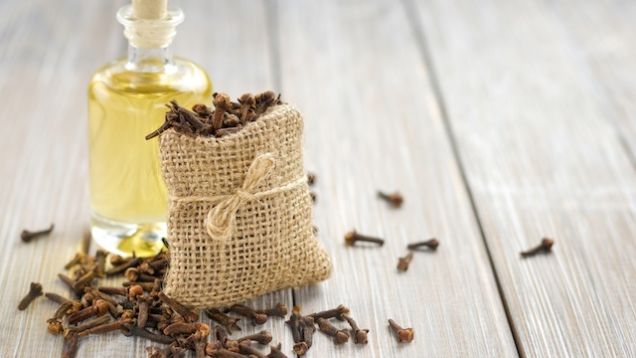- Clove is an herb. People use the oils, dried flower buds, leaves, and stems to make medicine.
Contents
Uses
- Clove is used for upset stomach and as an expectorant. Expectorants make it easier to cough up phlegm.
- Diarrhea
- Hernia
- Bad breath
- Clove and clove oil are used for intestinal gas, nausea, and vomiting.
- Clove is applied directly to the gums (used topically) for toothache, for pain control during dental work, and for a complication of tooth extraction called “dry socket.”
- It is also applied to the skin as a counter-irritant for pain and for mouth and throat inflammation.
- In combination with other ingredients, clove is also applied to the skin as part of a multi-ingredient product used to keep men from reaching orgasm too early (premature ejaculation).
- In foods and beverages, clove is used as a flavoring.
- In manufacturing, clove is used in toothpaste, soaps, cosmetics, perfumes, and cigarettes. Clove cigarettes, also called kreteks, generally contain 60% to 80% tobacco and 20% to 40% ground clove. Eugenol, one of the chemicals in clove, acts like menthol to reduce the harshness of tobacco smoke.
Benefits
- Clove oil contains a chemical that may decrease pain.
Cautions
- Clove seems LIKELY SAFE for most people when taken by mouth in food amounts. Not enough is known about the safety of taking clove by mouth in larger medicinal amounts.
- Clove oil or cream containing clove flower is POSSIBLY SAFE when applied to the skin. However, frequent and repeated application of clove oil in the mouth or on the gums can sometimes cause damage to the gums, tooth pulp, skin, and mucous membranes.
- Inhaling smoke from clove cigarettes or injecting clove oil into the veins is LIKELY UNSAFE and can cause side effects such as breathing problems and lung infections.
- Dried clove can also cause mouth sensitivity and irritation, as well as damage to dental tissues.
- Children:’ In children, clove oil is LIKELY UNSAFE to take by mouth. It can cause severe side effects such as seizures, liver damage, and fluid imbalances.
- Pregnancy and breast-feeding: Clove is LIKELY SAFE when taken by mouth in food amounts. There is not enough reliable information about the safety of taking clove in medicinal doses if you are pregnant or breast-feeding. Stay on the safe side and avoid use.
- Bleeding disorders: Clove oil contains a chemical called eugenol that seems to slow blood clotting. There is a concern that taking clove oil might cause bleeding in people with bleeding disorders.
- Surgery: Clove oil contains a chemical called eugenol that seems to slow blood clotting. There is a concern that it might cause bleeding during or after surgery. Stop using clove at least 2 weeks before a scheduled surgery.
Interactions
Minor Interaction Be watchful with this combination:
- Medications that slow blood clotting (Anticoagulant / Antiplatelet drugs) interacts with CLOVE: Clove might slow blood clotting. Taking clove oil along with medications that also slow clotting might increase the chances of bruising and bleeding. Clove contains eugenol. Eugenol is the part of clove that might slow blood clotting. Eugenol is very fragrant and gives allspice and clove their distinctive smell.
Some medications that slow blood clotting include aspirin, clopidogrel (Plavix), diclofenac (Voltaren, Cataflam, others), ibuprofen (Advil, Motrin, others), naproxen (Anaprox, Naprosyn, others), dalteparin (Fragmin), enoxaparin (Lovenox), heparin, warfarin (Coumadin), and others.
Other Names
Bourgeon Floral de Clou de Girofle, Bouton Floral de Clou de Girofle, Caryophylli Flos, Caryophyllum, Caryophyllus aromaticus, Clavo de Olor, Clous de Girolfe, Clove Flower, Clove Flowerbud, Clove Leaf, Clove Oil, Clove Stem, Cloves, Cloves Bud, Ding Xiang, Eugenia aromatica, Eugenia caryophyllata, Eugenia caryophyllus, Feuille de Clou de Girofle, Fleur de Clou de Girofle, Flores Caryophylli, Flores Caryophyllum, Gewurznelken Nagelein, Girofle, Giroflier, Huile de Clou de Girofle, Kreteks, Lavang, Lavanga, Oil of Clove, Syzygium aromaticum, Tige de Clou de Girofle.
References
Source: WebMD, “Clove”, www.webmd.com/vitamins-supplements/

